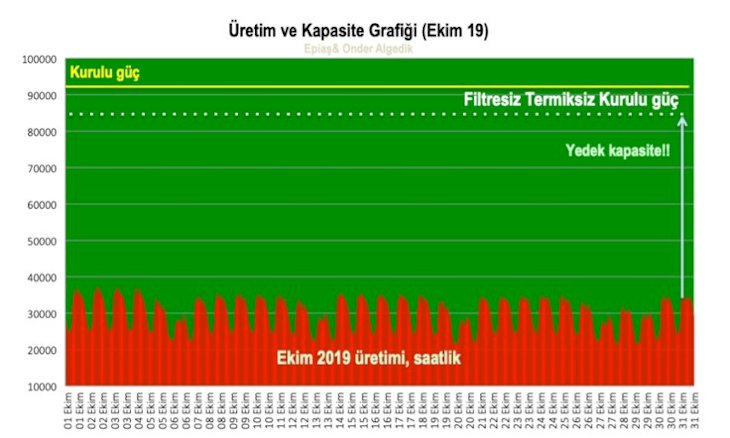All coal plants can be shut down!
It is possible for us to close down all coal mines! The way to this has been paved with the veto on the proposed bill. But if we leave public policy unattended and representatives continue to leave parliament seats empty, the opposite will happen. I should point out as a warning that, just like the Environment and City Planning Minister could actually be referring to the business schedule when he says “we installed a filter in 6 months,” a similar wordplay could be at hand with the veto. We will go after the answer together, I promise.
We have been discussing energy policies since Nov. 22 in the context of the privilege given to illegitimate fossil fuel plants to operate. When the bill was proposed to Parliament on Oct. 24, it drew no attention. When the bill was debated in commission on Nov. 1, it still didn't spark large-scale discussion. When it was presented to the General Assembly on Nov. 21, it was so narrowly debated that only 7 members of parliament took the floor.
Considering the discussion on the bill was so limited, the country must be an expert on energy since only 36 members voted against the bill. Think about it; only 14.2 percent of voters said “no,” but the whole country has been saying “no” for a week.
What could be better?
But the best part came after this column was finished. News broke in the evening that President Erdoğan had vetoed the bill. The impossible happened. Even though members of parliament thought “There's so few us, what will it matter if we don't vote?”, this happened thanks to the members who didn't vote.
This column was actually written way before the news broke, but I'll leave it as it is. Please read it and see for yourself the scandal behind the whole discussion. Maybe they knew about the scandal and withdrew the bill because of public pressure. But what's certain is that this step backwards doesn't mean more tricks don't lay ahead.
Discussing the future, not facts!
After the bill was passed, Environment and City Planning Minister Murat Kurum announced that filters would be installed within 6 months. He actually was just saying that the work schedule would be prepared in 6 months. He would somewhat quiet the public's rage with this wordplay. This was soon realized by the public.
Then came the news story by CNN Türk, where they calculated the cost of installing a filter on the smoke stack of a fossil fuel plant. The reaction against the program was very justified. But this is a problem we all have: Basing assumptions not on the facts we have, but on assumptions about the future; denying the most basic observations; not doing research and inventing a new mathematics is the neoliberal disease of the times.
#MathematicsResist
The news program had calculated the cost of closure a 630-megawatt plant for 10 to 12 days. A striking deduction was made that 32,000 people would be out of work. How they got that number is a laughing matter.
If it were only a laughing matter, that would be okay. If shutting down illegal plants in this country causes unemployment, stealing should be legal too! Couldn't we calculate unemployment caused by the fact that stealing is illegal?
Even though it's funny to consider this discussion from the viewpoint of a basic mathematics of energy, forgetting the primary duties of the government makes it tragic.
Coal is a basic public health issue!
It's a scientific fact that fossil fuel plants are a source of poison even when they have filters, let alone those without; there is vast scientific research about this. The dispersion of burned coal, or even coal that is separated into its components, causes a chain of public health threats.
To get the full picture, get a copy of Prof. Dr. Kayıhan Pala's 2014 report “Health Effects of Coal Plants” and observe Table 2, effects of the plants' chimney stacks on health and the environment. Just observe it and think about what that means for you. (You can find the study here.)
New scandals
Should we get down to the core of it then? There are such blatant scandals in question, and understanding them means being able to produce solutions.
Scandal 1: Privilege was granted to a dysfunctional plant that produces more pollution than electricity
According to the Turkish Energy Exchange, Soma A did not function in 2018 at all, and Afşin Elbistan A barely functioned at all. Soma A is a 1957 model junk pile. Afşin Elbistan A is a 1984 model, but the B plant was allowed on condition that a filter was installed. The Ministry for the Evaluation of Environmental Impact decision at that time has unfortunately not been followed. What's worse is that nothing changes, even when these plants aren't functioning. A simple example: Afşin Elbistan burned 13.5 million tons of coal in 2014 and produced 2.6 million Mwh of electricity. According to MTA (Mineral Research and Exploration General Directorate) reports, this would mean that 2.6 million tons of gold dust and 2.7 million tons of fly ash emerged as a result. Add to that 6.7 million tons of carbon dioxide that was released into the atmosphere. What did this plant end up producing? 5.5 million Mwh of electricity? Or 5.3 million tons of ash and 6.7 million tons of carbon dioxide? Or a crisis for the environment and the climate?
Scandal 2: Not many punishments in 2.5 years
The bill proposes that a work schedule be prepared within 6 months. So you would have to turn in a schedule within 6 months that outlines a plan showing the project, the bid, the construction, and when operations would start. This makes it okay for companies that haven't used filters for years to turn in a plan and say that the bidding, buying and creating a contract will take a while, and that they “will start installing the filter in the last 6 months.” Say that nothing is done in the last 6 months, that's also not a problem. They will get away with a small administrative fee: A maximum of 144,400 liras times 20, which is a plant's weekly income.
I'm sure firms are more familiar with this than I am. But the bigger scandal follows, and even this information must give you a hint towards where it's going.
Scandal 3: A possibility of working for 3.5 years instead of 2.5
The bill states that, “In case any item on the work schedule is taking more than a year longer than stated, operations at the the production facility will be terminated.” Say you will start operations on June 29, 2022, but you didn't. At all. Then the ministry can shut down your plant within a year. So the government put it in bold letters that they would wait another year! We were told 2.5 years of deferral for the installation of the filters, but the deferral is really 3.5 years.
But wait, this makes the situation impossible to solve, and imposes on all of us.
Good news: We can shut them all down!
The installed capacity of these plants, which is against current environmental legislation, is around 8,500 Mwh. Turkey's installed capacity was 91,500 Mwh as of October. The average electricity production per hour in October was 29,581 Mwh. So 32 percent of the installed capacity was enough. Production peaked on Oct. 2 between the hours of 2 and 3 p.m. The production of 37,183 Mwh at this time took only 41 percent of the installed capacity. So if 8,500 Mwh of the installed capacity were to be disabled, the rate of installed capacity in use would not go above 45 percent, and we would still have 55 percent installed capacity for back up.
With so much unoccupied capacity, we could shut down all coal plants, let alone these particular ones without filters. The road to this has begun to be paved with the veto of this bill. But if we leave public policy unattended and if representatives continue to leave parliament seats empty, the opposite will happen. I should point out as a warning that, just like the Environment and City Planning Minister could actually be referring to the business schedule when he says “We installed a filter in 6 months,” a similar wordplay could be at hand with the veto too. We will go after the answer together, I promise.

On the topic of unfiltered fossil fuel plants, it's clearly not about producing electricity. These plants produce more environmental and climate crises than they produce electricity. But with the regulations, it will be possible to get by with a fee of a few liras. They even got permission to continue as-is for 3.5 years, not even 2.5. There are three new scandals on the table. But the solution is simple: We can shut down all these plants instead of compromising the environment, the climate and our health for some peoples' profits. And it's not as hard as you think.

